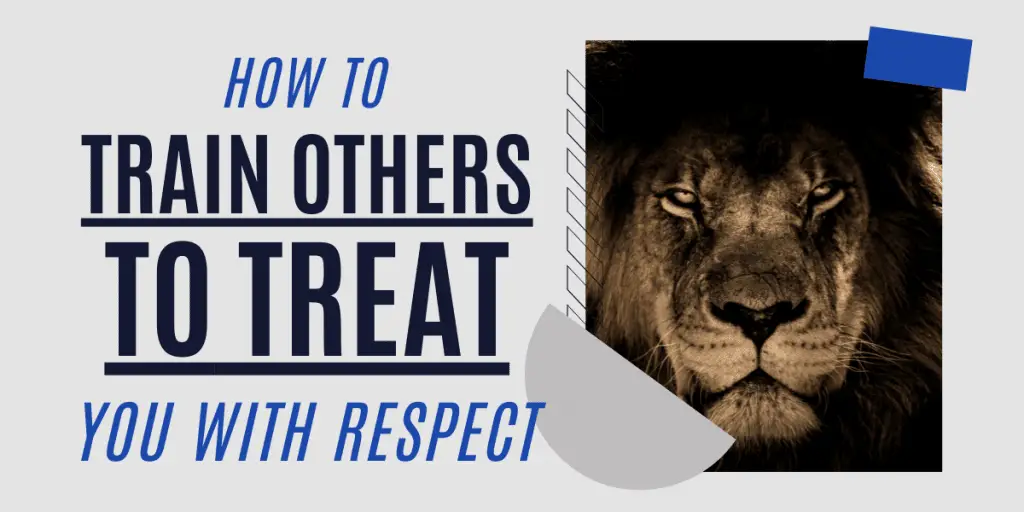You Teach People How To Treat You
Have you ever been in a situation where someone treated you in a way that was less than satisfactory? Do you wish you knew how to ensure people will treat you with the respect and kindness that you deserve?
If so, this article on “You Teach People How To Treat You” is for you! The article will explain exactly how it works and provide clarity on ways to set boundaries so that people can see how they should behave around you.

How to teach people how to treat you
What’s your experience?
- Do you find yourself regularly:

- Feeling that people don’t value or listen to you?
- Bothered that people talk about things around you that you find offensive or dislike for some reason?
- Get the impression that others take advantage of your kindness and willingness to help?
- Is it your belief that some people aren’t treating you the way you want or expect them to treat you?
- When you experience this regularly, it can be frustrating, stressful, and discouraging
What’s wrong with Them?!?
- When these scenarios happen, the thoughts that pop into your head probably center around the flaws of others:
- Why do they believe they’re better than me?
- They’re disrespectful – why do people like them?
- They sure like taking advantage of others when they can!
- This is known as victim mentality, which can lead you to accept things as they are because you largely feel powerless to change them – this isn’t true!
- The harsh reality is this – If you don’t teach people how you expect to be treated, they’ll typically treat you how they want to treat you
- You are in control, but you have to take control
- In a nutshell: You have to demonstrate to others through your words and actions what you find acceptable on unacceptable behavior. and stop assuming they should know by default:
- Input – If you want people to value/listen to your input, then share it with authority – don’t assume others ‘should know how you feel
- Conversations – If you don’t want to listen to the negative/offensive conversations of others, then walk away – don’t stay because you don’t want to appear rude
- Requests – If others ask you to do something you can’t/don’t want to do, then kindly say no’ – don’t do, then complain about how you were taken advantage of
- Reinforcement – If you want people to value and respect you, then express your appreciation to them when they do – reinforce behaviors you like
- Teach others how to treat you (by your words and actions! and you’ll be amazed at how the ‘bullies’ in your life will begin to either leave you alone or respect you
How to use this:
- Spend a few moments reviewing common or recent interactions you’ve had with others
- Identify times when you felt others didn’t treat you nice
- Define a word/action strategy for changing your results:
- When_ _ _ _ _ [name] _ _ _ _ _ _ [action]
- Then I will _ _ _ _ _ _ [words/actions]
How do you get others to treat you better?
One way to get others to treat you better is by improving your likability. Making an effort to be more friendly, approachable, and interested in others can make you more likable and, as a result, increase the likelihood that others will treat you better.
Additionally, exhibiting qualities such as empathy and understanding can also make you more likable and encourage others to treat you with more respect.
Why is treating people respectfully important?
Treating people respectfully is important because it helps maintain a positive social environment. It also sets a precedent for how we want to be treated in return. Furthermore, treating others with respect can help diffuse potential conflict situations and encourage cooperation.
Finally, demonstrating respect for others can be a way of modeling desired behavior and helping to create a more civil society.
How do you tell someone to treat you better?
In order to get someone to treat you better, you need to first identify the behavior that you want to change. Once you have identified the behavior, you need to communicate your expectations to the other person.
It is important to be clear and concise when communicating your expectations. Finally, you need to follow up with the other person to ensure that they are meeting your expectations.
How do you react if others are not respecting you?
If someone is not respecting you, it is important to stay calm and level-headed. It is crucial to remember that respect is a two-way street, and if you want to be respected by others, you must also respect them.
Try to see the situation from their perspective and understand why they might not be respecting you. Once you have done this, you can approach them calmly and try to resolve the issue.
Should you treat people how they treat you?
The answer to this question depends on the situation. If someone is consistently treating you poorly, then it may be best to distance yourself from that person.
However, if someone occasionally treats you poorly but is generally a good person, it may be best to overlook the occasional poor treatment and continue to treat them well.
How others treat you is a reflection of themselves.
The way in which others treat us is often a reflection of their own inner thoughts and feelings. If someone is rude or dismissive, it may be because they are projecting their own insecurity or lack of self-confidence.
Conversely, if someone is kind and attentive, it may be because they are comfortable in themselves and have a strong sense of self-worth. Either way, how others treat us says more about them than it does about us.
In conclusion, it is important to remember that you teach people how to treat you. It is up to you to set your boundaries and be confident in doing so. Speak up for yourself, take ownership of your feelings, trust your gut instincts, and keep an open mind about others’ opinions. With these tools, you can create relationships that are healthy and respectful for both parties involved.






